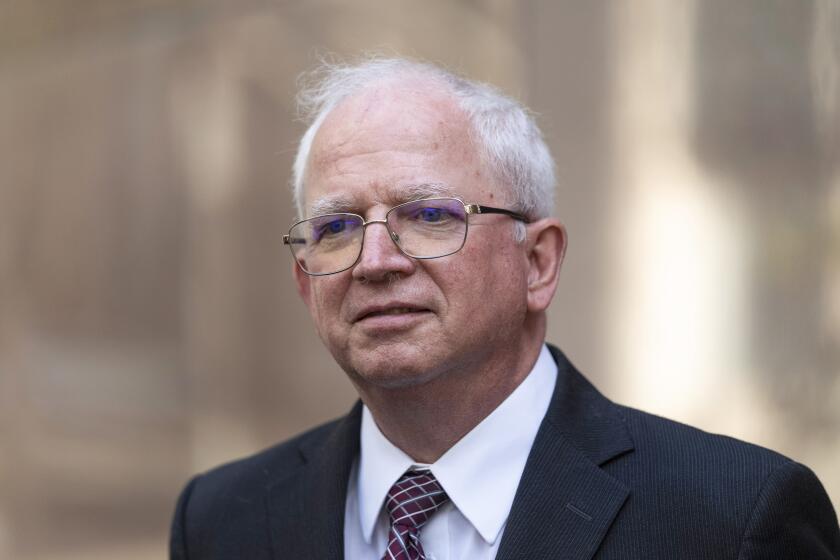THE MOSCOW SUMMIT : Reforms, U.S. Ties Spur Soviet Rights Gains
Miriam Orlov-Ainbinder traveled from Israel to Washington this month to remind President Reagan and other American officials that, unlike better-known refuseniks such as Natan Sharansky and Ida Nudel, her aged parents are still denied permission to leave the Soviet Union because her father worked on a rocket program 17 years ago.
“Those who were famous as refuseniks have been permitted to leave,” said Orlov-Ainbinder, whose parents, Boris and Esfir Orlov, have unsuccessfully sought to emigrate for 10 years. “Those who are not famous are still there by the thousands. If there is no pressure, they will remain there forever.”
Orlov-Ainbinder’s personal campaign dramatizes a difficult problem facing Reagan as he approaches the Moscow summit at a time when the Kremlin has made an almost astonishing series of moves toward greater openness in what has long been one of the world’s most relentlessly repressed societies.
The question Reagan must deal with is how far to go in congratulating the Soviets on their progress on human rights and how far to go in condemning them for the substantial gap that remains between their performance and the standards agreed upon in the Helsinki accords of 1975.
Sees Significant Changes
“There’s no doubt that the Soviet Union is still far from living up to its human rights commitments under the Helsinki final act,” Richard Schifter, assistant secretary of state for human rights, told a congressional committee recently. “And yet, if we compare the amount of personal freedom allowed today with conditions of, let us say, three years ago, we do find the differences both startling and encouraging. . . . These changes are far more than cosmetic, but so far less than fundamental.”
Indeed, the field of human rights represents perhaps the most astonishing change in the Washington-Moscow dialogue since Reagan’s first summit meeting with Soviet leader Mikhail S. Gorbachev in 1985. Three years ago, the United States was uncompromising in its denunciation of Soviet repression, and the Soviets were just as determined in their refusal even to listen to American criticism.
“There were probably more mutual suspicions, mistrust, prejudice and simple misunderstanding--at times even the rejection of the position and the arguments of each other--in this field than in military and strategic issues,” Andrei Grachev, an official of the Soviet Communist Party Central Committee, told newsmen in Moscow recently.
Today, by contrast, both sides are not only talking but each accepts the legitimacy--within some bounds--of the other side’s concerns.
Soviets Cite U.S. Failings
For their part, U.S. officials at recent meetings have listened patiently as Soviet officials have taxed them on such alleged U.S. human rights violations as homelessness, unemployment and capital punishment of minors. American officials do not reject the complaints out of hand, although they profess bemusement at Moscow’s list and maintain that--despite Marxist theory--the Soviet Union also has its homeless and its unemployed.
“We accept that the discussion of human rights is a two-way street,” one senior Administration official said. “They have a whole register of complaints about our practices, some of them more folkloric than others. . . . They raise particular cases with us, and we make explanations of what has happened.”
Far more striking and potentially significant is the change in the Kremlin’s stance. While remaining highly defensive when lectured too publicly, Moscow has taken steps to change its human rights policies in ways that were almost unimaginable just a few years ago.
And they have done so for reasons the Soviets themselves acknowledge are highly pragmatic:
--At a time when Gorbachev wants to demonstrate that Soviet relations with the United States are stable and improving, human rights is now recognized as an unnecessarily costly irritant.
‘Contention Over Rights’
“We were quite aware of how the contention over human rights, particularly over Jewish emigration, had contributed to the collapse of earlier efforts at detente,” a Soviet diplomat in Moscow said recently. “And so, as we sought to improve our overall relationship, we looked at the various elements to see how we might improve them, one by one, to strengthen the whole effort.
“Many also felt, to put it bluntly, the emigration of a few thousand Jews was not worth jeopardizing the whole relationship we were building, or trying to build, with the United States,” he added.
--More important, Gorbachev and his allies have concluded that they cannot enlist the creative energies of the Soviet people in their massive program of economic revitalization, or perestroika, if they do not simultaneously grant more freedom of expression.
“Perestroika cannot really be implemented from above, but only by the people,” says Tatyana Zaslavskaya, director of the Center for the Study of Public Opinion and Socioeconomic Problems and an adviser to Gorbachev. “And for that reason, we must accelerate the process of democratization.”
As Gorbachev put it in a recent interview with the Washington Post and Newsweek:
“We are resolving these issues not because we want to please somebody, but because this meets the interests of our society, because perestroika cannot be carried out without it, and last but not least, because it is wanted by the Soviet people, who have long outgrown the restrictions which they put up with in the past--and which were to a certain extent an inevitable part of the revolutionary development which we have gone through.”
“The greatest change that has come about is that people are no longer afraid,” says Soviet writer Arkady Vaksberg. “No one looks over his shoulder any more before saying what he thinks, and people do say what they think.”
Perhaps mindful that yesterday’s dissident could be tomorrow’s party adviser, the government has allowed people to form nearly 30,000 special interest groups as an outlet, mostly for discussion, although some have mounted campaigns on environmental protection, preservation of historical monuments and other issues.
Yet startling as all this is when measured against the Soviet past, it is not freedom of speech as provided, for example, by the U.S. Constitution. And those in the Soviet Union who are exploring glasnost, or political openness, are discovering where the limits are--sometimes painfully.
When a group of dissidents met in Moscow earlier this month in an attempt to establish a new political party, the Democratic Union, their would-be convention was broken up by Soviet security forces and the editor of the leading underground journal, Sergei Grigoryants, a former political prisoner, was detained for a week.
Gorbachev, in the Post/Newsweek interview, described Grigoryants as “some kind of alien phenomenon in our society sponging on the democratic process, sponging on the positive aspects of perestroika. “
This crackdown is mild compared to the tough action taken against dissidents in the 1970s, when they were jailed, often for seven years, for “anti-Soviet agitation and propaganda.” Grigoryants himself was released under a 1987 amnesty that freed several hundred political prisoners.
Pluralism Soviet-Style
But the limits are very real. “Pluralism” is to be socialist and based on Communist Party leadership.
Thus the Reagan Administration, while pleased at the changes, still intends to confront the remaining problems directly at the summit, which opens Sunday in Moscow.
A senior Administration official said Reagan would raise three basic subjects in his talks with Gorbachev:
--Political prisoners. A number of political prisoners have been released recently, but the official said “there are still far too many people . . . in jail” for trying to act according to the dictates of their own consciences.
--Emigration. The number of Jews, Armenians and ethnic Germans allowed to leave the Soviet Union has increased sharply, but there are still long lists of persons who have been denied permission to emigrate.
--Religious freedom. Gorbachev recently promised to ease Soviet restrictions on religious practice. But the official said the regime continues to persecute religious activities other than those officially authorized by the state, primarily the Russian Orthodox Church, which he said has been infiltrated by the KGB.
Dissidents Punished
According to the State Department’s Schifter, the Soviet Union continues to punish political dissidence--but activities that once brought long terms in a labor camp now are handled by arrest, summary beating and release. As a result, he said, the numbers of political prisoners have declined to “the low hundreds.”
However, he said, “We must note that scores of persons heretofore convicted of political offenses, or for the unauthorized practice of religion, continue to languish in prison camps or in Siberian exile. . . . It is an anomaly that someone could be serving a long prison sentence in 1988 for an act committed in 1983, (when) if the same act was committed today (it) would remain completely unpunished.”
Within the past 18 months, the Soviet government has permitted most of the best-known Jewish refuseniks to leave the country. At the same time, Jewish emigration has increased to about 1,000 a month, the highest level since 1980. German ethnic emigration is averaging about 2,500 a month and Armenian emigration about 1,200 a month, both the highest levels in more than a decade.
Emigration is virtually impossible for persons who do not fall into the Jewish, German and Armenian ethnic groups. But the Soviet authorities continue to refuse to permit many individuals in each category to leave. The reasons are varied and, U.S. officials say, often specious.
For instance, Abe Stolar, 76, who was born in Chicago and holds an American passport, has been trying since 1975 to obtain permission to move to Israel. Soviet authorities have refused to allow the family to leave because Stolar’s daughter-in-law, Julia, cannot obtain the approval of her estranged mother.
‘Rocket Refuseniks’
Under Soviet law, parents must approve the emigration of their children, even if the children are adults who have not seen their parents for years.
Boris Orlov, 81, has been turned down because he worked on a Soviet rocket project in 1971. Moscow refuses to permit the emigration of persons who know state secrets even if the secrets have long since become outdated. Schifter refers to this class as “rocket refuseniks.”
Schifter said the Soviet government “has basically given up on the deep commitment to conducting atheistic propaganda.” But he said the government continues to repress religious practice, although by somewhat more subtle means.
According to the Puebla Institute, a Roman Catholic human rights organization in Washington, the Soviet Union continues to ban the Ukrainian Catholic Church, the Ukrainian Orthodox Church, the Jehovah’s Witnesses, Hare Krishnas and many other “unauthorized” religious groups.
“Worship by legal religions is prohibited unless it is done in a state-approved building by a state-approved congregation,” the organization added.
Norman Kempster reported from Washington and Michael Parks reported from Moscow.
More to Read
Start your day right
Sign up for Essential California for news, features and recommendations from the L.A. Times and beyond in your inbox six days a week.
You may occasionally receive promotional content from the Los Angeles Times.






